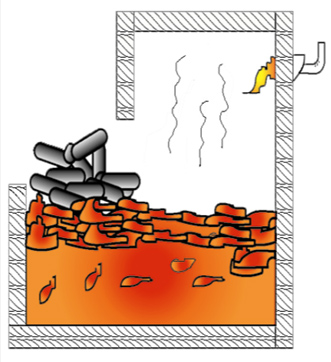Basics of Stack Melting
Aluminum shaft, or stack furnaces are now widely accepted as a modern operational and sound financial choice because of their higher energy efficiency than of the reverberatory furnace. The stack melter efficiency is improved by better sealing of the furnace and the use of the flue gases to preheat the charge materials. The charge materials slide down the shaft and reach the melting zone where they are melted by the burners, and the molten metal flows down to the holding area. The hot exhaust gases from the melting zone flow through the shaft to preheat the incoming charge, improving the energy efficiency of the stack furnace by 40 to 50%. Melt loss is also dramatically improved from 4-8% in a reverb, down to 1% or less in a well operated stack melter.
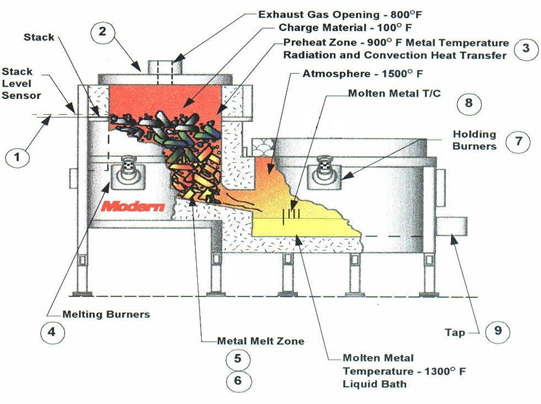
Jet Melter® Stack Detail
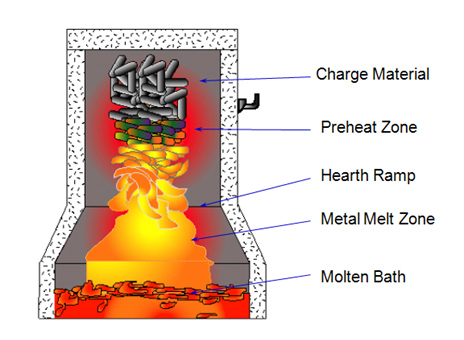
Back to Top
Reverb Melting Disadvantages
Reverb Furnace Problems
Poor Thermal Efficiency - Only 25%
Accelerated Dross Formation - 3% to 7%
Large Metal Temperature Variations +/- 50º F
Higher Inclusions Levels
Larger Bath Required To Melt Aluminum
Greater Hydrogen Gas Pick Up
Reverb Cost Variables
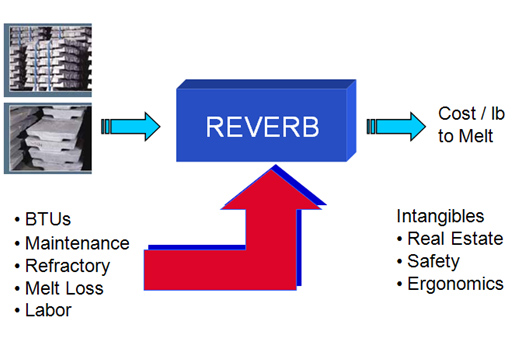
Back to Top
Technology Comparison Chart
A Clear Green Option, The Real Financial Choice
Comparison Data
Fuel Consumption (Btu/Lb.)
Thermal Efficiency (%)
Metal Loss (%)
Refractory Cleaning
Refractory Life (years)
Charging System
Bath Capacity to hourly melt rate ratio
Molten metal Temp. variation
Noise Level
Jet Melter®
900 - 1000
45 - 55
0.7 - 1.5
Once per day
5 to 8
Semiautomatic or Automatic
2.5 : 1
± 10° F
< 85 dba
Reverb Furnace
1500 – 3000
24 – 32
3 – 7
Once per day
2 to 4
Manual or Semiautomatic
10 : 1
± 50° F
> 90 dba
Back to Top
Actual Comparison of Melter Performance
(Side by Side Test Results)
Melt Loss
Energy Usage
Molten Metal Temp. Control
Metal Specific Gravity
Metal Cleanliness K-Value
Jet Melter®
0.9%
955 Btu#
± 5° F
2.26
0.0
Reverb
5.5%
1975 Btu#
±32°F
2.10
0.10
Alloys added for chemistry adjustment
Back to Top
Melt Quality Comparison
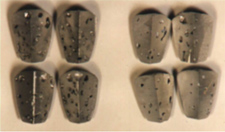
10:50 AM - S.G. = 2.16 11:50 AM - S.G. = 2.26Modern Jet Melter®
Gas Samples
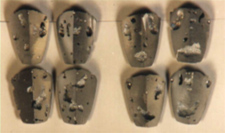
11:07 AM - S.G. = 2.10 12:12 PM - S.G. = 2.10Reverb Melter Gas
Samples
Back to Top
Estimated Payback Analysis
Melting Costs ** Typical 2000 #/hr (1 shift operation)
- ASSUMPTIONS
- UNITS
- JET MELTER
- REVERB
- Melt Loss
- percent
- 1%
- 4%
- Aluminum Cost
- $ per pound
- $ 1.20
- $ 1.20
- Energy cost
- Average $ per therm
- $ .32
- $ .32
- Energy usage
- Btu's per pound melted
- 1000
- 2000
- Aluminum Usage
- Pounds Melted per Month
- 333,333
- 333,333
- COST TO MELT PER POUND
- $0.0032
- $0.0064
- ENERGY COST PER MONTH:
- $1,066
- $2,133
- MELT LOSS COST PER MONTH:
- $4,000
- $16,000
- TOTAL MELT COST PER MONTH:
- $5,066
- $18,133
- MONTHLY SAVINGS
- $13,067
Melting Costs ** Typical 2000 #/hr (1 shift operation)
- ASSUMPTIONS
- UNITS
- JET MELTER
- REVERB
- Energy Cost
- Average $ per therm
- $.32
- $.32
- Energy Usage
- Btu's per pound held (assumed)
- 50
- 50
- Amount Held
- Pounds Held
- 5,000
- 20,000
- Holding Period
- Hours held monthly
- 533
- 533
- COST TO HOLD PER MONTH
- $426
- $1,706
- MONTHLY SAVINGS
- $1,280
- TOTAL MONTHLY SAVINGS (Melt & Hold)
- $14,347
9 Reasons Why: Stack Melter Technology Beats Traditional Reverb Furnaces
- Improve safety due to limited exposure to molten metal and pre-heating of the charge material
- Floor space reduced due to 2.5x holding capacity versus 10x
- Efficiency of 1,000 Btu per pound versus 2,500 Btu
- Lowered holding costs caused by 2.5x holding capacity versus 10x in a reverb
- CO2 emissions lowered (less gas burned = less CO2)
- Lower melt loss (1% vs.3-8%)
- Improved process control and resulting metal quality caused by only a +/- 10 degree F holding temperature variation versus large swings each time a cold charge is placed into the hot bath
- Improved process control and resulting metal quality due to reduced gas levels created by more stable temperatures and reduced burner fluctuation and reduced surface area within the bath
- Reduced manpower requirements with automated charging systems vs. manual charging exposing operators to metal splash.
Back to Top

Why Buy Modern Equipment?
- Designed and Manufactured in the USA
- Project Capabilities from Design to First Melt
- Complete Turnkey Solutions
- Spare Parts Readily Available
- On Site Service and Technical Support
- Over 120 satisfied installations and repeat customers! The clear industry leader!
Get more details or contact us for a complementary ROI assessment:
Loren Tieman
National Market Manager
262-957-7940
ltieman@moderneq.com




